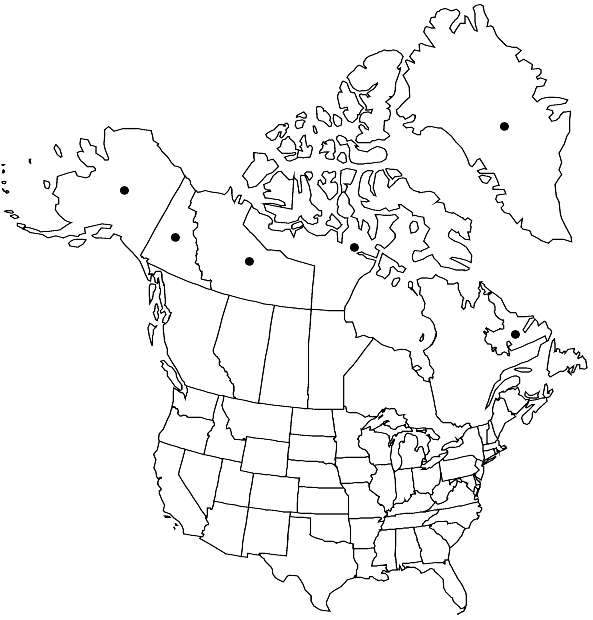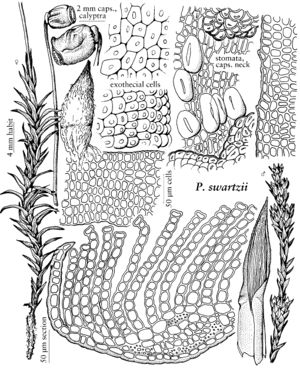Polytrichum swartzii
Handb. Skand. Fl. ed. 5, 361. 1849,.
Plants often rather soft and flexuose, green to blackish when old. Stems 2–9 cm, simple, erect, in proximal part moderately to densely brownish tomentose. Leaves 3–8 mm, loosely imbricate, appressed to erect-spreading and flexuose when dry, patent to widely spreading and weakly recurved when moist; sheath rectangular, scarcely narrowed to the blade; blade lanceolate to linear-lanceolate, often caducous at the junction of sheath and blade, the apex subulate, weakly channeled; marginal lamina 6–9 cells wide, distantly toothed to subentire; costa excurrent as short brown entire to serrulate tip, smooth abaxially or with a few teeth near apex; lamellae in profile entire to shallowly crenulate, 5–10 cells high, the marginal cells in section usually somewhat broadened, flat-topped or shallowly grooved, single or geminate, thin-walled, smooth, the marginal cells of lateral lamellae asymmetric; median sheath cells 75–110 × 2–12 µm, linear; cells of marginal lamina 9–15 µm, quadrate, thin- to firm-walled; perichaetial leaves with long sheathing bases and short subulate blade. Seta 2.5–5 cm, reddish brown. Capsule 2.5–3 cm, ± cubic, sharply 4–angled, suberect when mature, becoming horizontal when old; peristome teeth 64, 160–210 µm, obtuse, the basal portion 60–75 µm. Spores 12–15 µm.
Habitat: Very wet and regularly flooded situations, sedge meadows, wet tundra and lake shores (D. G. Long 1985)
Distribution

Greenland, Nfld. and Labr. (Labr.), N.W.T., Nunavut, Yukon, Alaska, Europe (Scandinavia), n, e Asia, Atlantic Islands (Iceland).
Discussion
Polytrichum swartzii is a northern species with distantly toothed to subentire leaves, differing chiefly by the rounded-quadrate, flat-topped (not retuse or grooved) and scarcely-thickened marginal cells of the lamellae. The capsules are shortly cubic. In Nunavut, it is known from Baffin and Devon islands.
Selected References
None.
